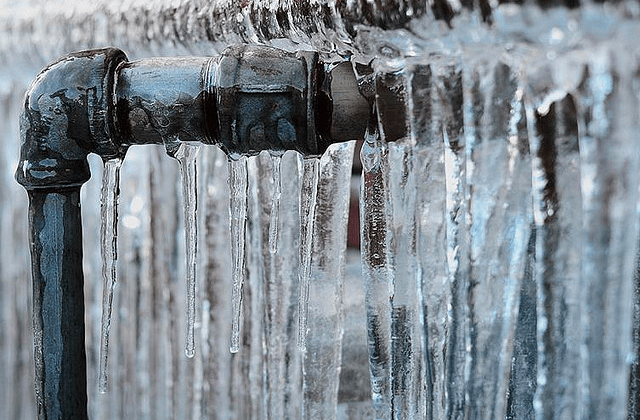Key Approaches for Preventing Frozen Plumbing in Cold Weather
Key Approaches for Preventing Frozen Plumbing in Cold Weather
Blog Article
We have encountered this article relating to Helpful Tips to Prevent Frozen Pipes this Winter directly below on the internet and figured it made perfect sense to share it with you here.

Cold weather can damage your pipes, especially by freezing pipes. Below's how to prevent it from happening and what to do if it does.
Intro
As temperature levels decline, the risk of icy pipelines increases, potentially causing costly repair services and water damages. Comprehending just how to avoid icy pipes is crucial for property owners in chilly climates.
Avoidance Tips
Shielding at risk pipes
Wrap pipes in insulation sleeves or use warm tape to safeguard them from freezing temperatures. Focus on pipes in unheated or exterior areas of the home.
Heating strategies
Maintain interior areas sufficiently heated, specifically areas with plumbing. Open closet doors to allow cozy air to circulate around pipes under sinks.
How to recognize icy pipelines
Try to find reduced water circulation from faucets, uncommon odors or sounds from pipes, and visible frost on revealed pipelines.
Long-Term Solutions
Architectural changes
Take into consideration rerouting pipelines away from outside walls or unheated locations. Add extra insulation to attic rooms, cellars, and crawl spaces.
Updating insulation
Purchase top quality insulation for pipes, attics, and wall surfaces. Correct insulation assists keep consistent temperature levels and minimizes the danger of icy pipes.
Protecting Outdoor Plumbing
Garden hose pipes and outside faucets
Detach and drain pipes garden tubes before winter. Install frost-proof spigots or cover exterior taps with protected caps.
Comprehending Frozen Pipelines
What creates pipelines to ice up?
Pipes freeze when exposed to temperature levels listed below 32 ° F (0 ° C) for expanded periods. As water inside the pipelines freezes, it expands, putting pressure on the pipeline wall surfaces and possibly creating them to burst.
Dangers and damages
Icy pipes can lead to water supply disturbances, building damages, and expensive repair work. Ruptured pipelines can flooding homes and create considerable architectural damage.
Indicators of Frozen Pipes
Identifying frozen pipes early can avoid them from breaking.
What to Do If Your Pipelines Freeze
Immediate activities to take
If you suspect frozen pipelines, maintain faucets available to ease stress as the ice melts. Utilize a hairdryer or towels taken in warm water to thaw pipelines slowly.
Final thought
Stopping frozen pipelines requires proactive measures and quick feedbacks. By comprehending the causes, indications, and preventive measures, home owners can secure their pipes throughout winter.
Helpful Tips to Prevent Frozen Pipes this Winter
UNDERSTANDING THE BASICS: WHY PIPES FREEZE AND WHY IT’S A PROBLEM
Water freezing inside pipes is common during the winter months, but understanding why pipes freeze, and the potential problems it can cause is crucial in preventing such incidents. This section will delve into the basics of why pipes freeze and the associated problems that may arise.
THE SCIENCE BEHIND FROZEN PIPES
When water reaches freezing temperatures, it undergoes a physical transformation and solidifies into ice. This expansion of water as it freezes is the primary reason pipes can burst. As the water inside the pipe freezes, it expands, creating immense pressure on the walls. If the pressure becomes too great, the pipe can crack or rupture, leading to leaks and water damage.
FACTORS THAT CONTRIBUTE TO PIPE FREEZING
Low Temperatures: Extremely cold weather, especially below freezing, increases the risk of pipes freezing. Uninsulated or Poorly Insulated Pipes: Pipes located in unheated areas, such as basements, crawl spaces, or attics, are more prone to freezing. Insufficient insulation or lack of insulation altogether exacerbates the problem. Exterior Wall Exposure: Pipes running along exterior walls are susceptible to freezing as they encounter colder temperatures outside. Lack of Heating or Temperature Regulation: Inadequate heating or inconsistent temperature control in your home can contribute to frozen pipes. PROBLEMS CAUSED BY FROZEN PIPES
- Pipe Bursting: As mentioned earlier, the expansion of water as it freezes can cause pipes to burst, resulting in significant water damage.
- Water Damage: When pipes burst, it can lead to flooding and water damage to your property, including walls, ceilings, flooring, and personal belongings.
- Structural Damage: Prolonged exposure to water from burst pipes can compromise the structural integrity of your home, leading to costly repairs.
- Mold and Mildew Growth: Excess moisture from water damage can create a favorable environment for mold and mildew growth, posing health risks to occupants.
- Disrupted Water Supply: Frozen pipes can also result in a complete or partial loss of water supply until the issue is resolved.
WHY CERTAIN PIPES ARE MORE PRONE TO FREEZING
- Location: Pipes located in unheated or poorly insulated areas, such as basements, crawl spaces, attics, or exterior walls, are at higher risk of freezing.
- Exterior Pipes: Outdoor pipes, such as those used for irrigation or exposed plumbing, are particularly vulnerable to freezing as they are directly exposed to the elements.
- Supply Lines: Pipes that carry water from the main water supply into your home, including the main water line, are critical to protect as freezing in these lines can affect your entire plumbing system.
- Underground Pipes: Pipes buried underground, such as those connected to sprinkler systems or outdoor faucets, can be susceptible to freezing if not properly insulated.
https://busybusy.com/blog/helpful-tips-to-prevent-frozen-pipes-this-winter/

I stumbled upon that write up about Winter Plumbing Precautions: Preventing Frozen Pipes while looking around the web. Don't hesitate to set aside a second to promote this blog if you enjoyed it. Bless you for being here. Return soon.
Book Service Report this page